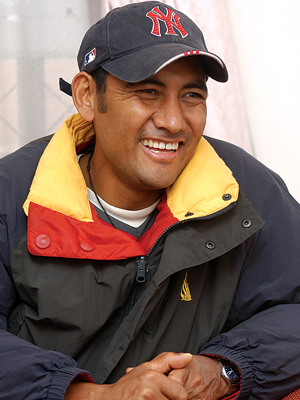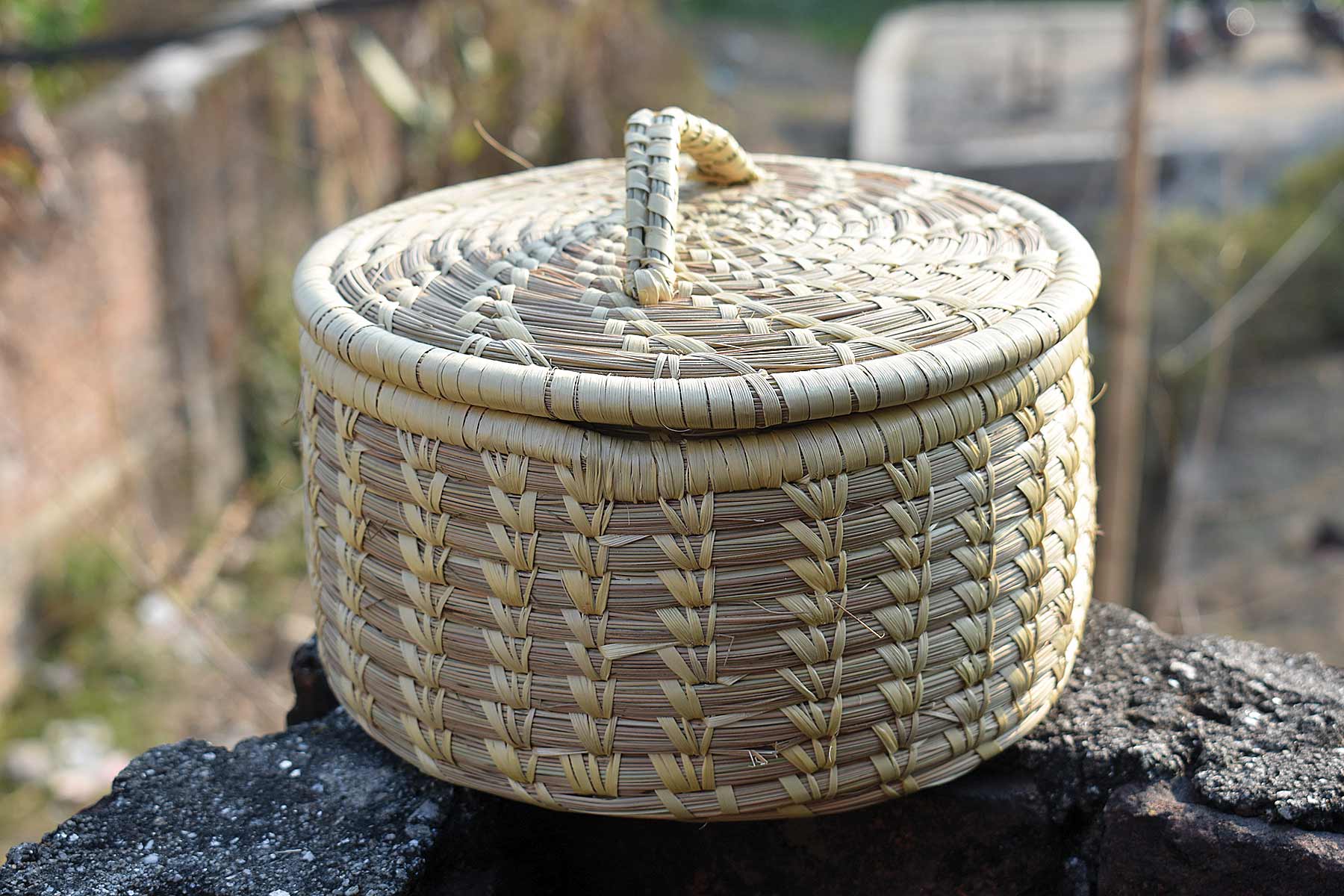“I think I am doing something special in my life, for my country. I am trying to be a nice person, not a big person.”
Pushkar Shah set out from a small village in Dolakha in 1998 with just a bicycle and 60 kgs of essentials on it. A man with a strong, inborn drive to see the world while conveying a message of peace, Pushkar is not just a world touring cyclist; he is a man with a mission, seeking world peace. Pushkar’s aim is to travel around the world in 11 years on his bicycle and in this regard Sir Edmund Hillary has aptly said, “Pushkar is climbing his own Everest.” Thirty-six year-old Pushkar has traveled to 70 countries around the world and has covered 1,15,000 km on a bicycle. But his journey is not about statistics: it is about spending the prime years of his life on the road, spreading the message of peace. He is Nepal’s unofficial ambassador. Pushkar Shah shares his wisdom, experiences and opinions in a free wheeling interview with Anita Lama.
 Tell us about your recent travels.
Tell us about your recent travels.
Two years ago, after having traveled to 51 countries, I came back to Nepal. Then I went to South America, after which I am returning after having visited a total of 70 countries, Liberia being the last one.
Tell us your story.
I was born on a full moon night in a cowshed. It was in my uncle’s house and according to tradition my mom was kept in the cowshed. As I was born on a full moon night, my grandma gave me the name ‘Joon’. In school, an English teacher said joon in English would be moon so he started calling me, ‘moon’. Later a Sanskrit teacher said that I was bright like the sun and not like the moon, so my name became ‘Pushkar’ meaning ‘sun’.
Who are the renowned personalities you have met so far?
Sir Edmund Hillary, Martin Luther King’s son, secretaries and undersecretaries of the UN and prime ministers of many countries. Sir Edmund Hillary is my hero and it was my dream to meet him. Besides, in New Zealand, my cycle was stolen, and he replaced all my stolen belongings.
Can you briefly mention the major bad experiences of your journey?
In New Zealand my cycle was stolen. In Barbados, I was attacked with a knife when I was sleeping in my tent. Two years back I escaped from death, in Mexico.
Tell us about the Mexico incident and why you think they attacked you?
While I was resting on the road three people caught hold of me and took me away with them. Kidnappers normally take the kidnapped to some place where he is given food and then they ask for ransom by calling the relatives or the embassy. But when they took me to a jungle, I knew they were going to kill me. I was taken 180 km inside the jungle, nearly 31/2 hours away. I told myself that if I have to die, then I might as well fight and not die like an animal—helpless. I beat up one of the assailants, threw him and ran away. I could not understand why they did it as they could not speak English and I could not speak Spanish.
What about the good experiences?
In Guadaloupe, on my way to Dominica, my plane was already moving and I was not on it, but they made it stop and turn. The doors opened and I walked in with everyone staring at me. At the airport I was also interviewed by Edna Fortescue, the Managing Director of the Liat Islander magazine and she paid me $250 for it. When I was preparing to go to Senegal, the Senegalese ambassador invited me to his office. He shook my hand and gave me 10,000 CFA (Senegal currency). I also got my visa free of cost. But getting into the country was not easy as I had to pay a lot of bribes. I was featured in a lot of local newspapers and TV channels in various countries. So strangers would stop and talk to me. In the Dominican Republic, I met Andri who had seen me on TV and he bought me coffee, paid my internet bills and gave me a Dominican flag. A girl from Barbados took a picture with me and paid US $ 5 for it. While getting off the plane there, I was met by a girl named Hazel screaming excitedly, “You’re the cyclist!” and I was given VIP treatment. So I had a lot of good experiences besides the problems.
What have you learnt after all the dangers that you have faced?
You are alert the next time. But you don’t know what is going to happen next because every place is different and no matter how alert you try to be, time and environment does bring a change in you. You can only doubt people or be alert, but that doesn’t guarantee your overall security.
Does the wisdom and experiences gained make you feel alone in our society because the experiences are yours alone?
I think I am doing something special in my life, for my country. I am trying to be a nice person, not a big person. Everyday I ride a bicycle, 10 to 12 hours starting from 7 in the morning to 7 in the evening, so in that time I am always alone and there are times I miss my family, my country, my friends, but I meet new families, new friends everyday. And that’s how I comfort myself. I have been a peace messenger from a small country like Nepal introducing the land of Mt. Everest and Gautam Buddha to these 70 countries amidst millions of people and that I consider as my success. And media persons are with me supporting my cause, maybe they are not with me but they are the backbone of my journey, so I am not traveling alone.
How far, do you think you have accomplished your mission?
I am on my way. Tomorrow the journey can stop too, you never know. I am prepared for anything but I do hope to finish my journey.
In these 6 years 3 months of your journey, I am sure people know more about Nepal for it’s Maoists insurgency. Do they ask you regarding the problems or its potentials?
Nepal is known only in developed countries. In developing and underdeveloped countries you have to introduce Nepal to them. Yes, media persons do ask about the problems faced by the country.
Do you face monetary difficulties?
Yes, I do! My mother had given me NRs. 100/- on the first day of my journey. I still have that money with me. I ask and travel everyday. Sometimes people give me food, sometimes money and sometimes I work and after saving some money I start traveling again.
Have you ever faced any health problems during the journey?
I have cycled from -2 degrees cold to 42 degrees heat in the desert. Everyday the climate is changing for me. Wherever I go, I drink whatever water I get mainly because I cannot afford to pay for the mineral water. There are days when I do not even have $1 with me but I continue my journey sometimes without food, sometimes eating orange peals, sometimes on sugarcane and sometimes just on water. I feel that maybe because I was born and brought up in the hills, my digestive system is really strong because in these 6 years of traveling, I have not suffered from any common cold or cough.
When you are cycling alone in far away places, jungles, what are the thoughts that cross your mind?
Sometimes I feel really angry. Many times when I have to cycle on a hungry stomach especially on a long stretch of jungle and there is nothing to eat then I keep the cycle down, place the helmet as a pillow and I ask myself, for what am I doing all this? I feel like throwing the cycle and running away but where to run? It’s not like you are in Pokhara or Birgunj; you are thousands and thousands of miles away. Then again you tell yourself, c’mon you have to go, you have to complete the journey.
What is your philosophy in life?
One world, one moon, one sun, one sky! The world is one house and we are all one big family living in that house. People are divided because of different religions, but we all live under the same sun, share the same sun.
Do you receive any kind of support from Nepali embassies and consulates?
I think their attitude is very negative. They never think that Pushkar Shah is a person carrying the flag of the country and we should support him. They consider themselves diplomats and look down on me as an ordinary cyclist on the streets. In Bangladesh I have paid 200 Taka for 4 nights in the Royal Nepalese Embassy. In the Royal Nepalese Embassy in India, I requested the ambassador to help me with food and lodging for 1 week and I was told that if the embassy is to arrange for food and lodging for people like me, then in Delhi alone, 2 lakh people come to travel. In China, even though the embassy has a guesthouse they made me sleep in the garage. You can imagine how I must have felt.
What is your future plan after the completion of your journey?
After I finish my tour in 2009, I plan to climb Everest in 2010 and place the flags of all countries atop the summit of Everest. I think I will be tired after having cycled for 11 years as the knee also has its limitation, so I will give it a rest and after that I’ll write a book on my world journey— whatever I know, whatever I have seen, whatever I have experienced. I want to share my experiences with the people of the world so that even if a person has not traveled the world, the book should give him the experience of having traveled the world through my stories. If I have traveled the world and if I do not write the book, then the purpose of having traveled the world holds no meaning. Whatever experiences I have gathered will die with me. After the book, I will return to my village and get into social work. In my village, people used to tell me that I might forget the way back and I have to tell them, ‘look I have not forgotten my way.’
What is your message to people in Nepal?
We should not strive to become big people but genuine/asal people. We should try to make our life not complete/sampanna but happy/sukhi. A person, who works towards making his life sampanna, is always worried. To the government, I ask them to also think for those people who carry the flag of the country. Let us strive for peace as peace is the need of the hour and without peace nothing is possible in this world.
Tell us about the upcoming bicycle rally?
One of the reasons for my return is the cycle rally, which is scheduled for 10th, 11th and 12th of March from Kathmandu to Pokhara. I felt if I am spreading the message of peace around the world, then I should spread the same message in my country as well. Our slogan is, “Let us drop sweat in our country’s soil, not blood.” Participants can contact the Wave magazine as they are the organizers or they can contact me at nepalcyclist@yahoo.com.
For more information visit www.pushkarshah.com

Massage Away your Stress
A Five Thousand-Year-old Ayurvedic massage helps you de-stress from your hectic life. Life brings in a lot...








